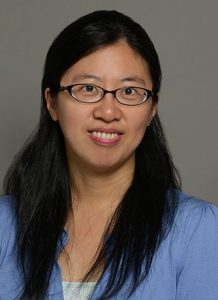March 29, 2021

Fifth-generation wireless technology is poised to transform our daily lives. How? That’s a question Mizzou researchers will begin investigating in an innovative new 5G lab opening on campus later this year.
MU and AT&T are collaborating on the lab in Cornell Hall, which will bring 5G+ millimeter wave capability to campus. Fang Wang, an assistant teaching professor in the Information Technology Program, is part of a team currently configuring the lab space, which she plans to start using next semester.

Feng Wang
Wang and Jim Flink, associate professor of strategic communication in the Missouri School of Journalism, are developing an interdisciplinary course that will let students explore 5G applications, primarily in the field of health care.
“I’m eager to expose IT students to it and to have them be among the first to experience and learn to develop with this 5G technology,” Wang said. “We’ve heard a lot about it and talked a lot about it. Now we are eager to have some hands-on experience with it.”
A Better Platform for VR, AR
5G has three primary benefits over previous generations of wireless technology. It speeds up data, has the ability to connect more devices at one time, and it reduces latency, or delays. The latter is especially important for Wang, who works with virtual reality (VR).
“We’ll see more applications being developed when we have more access to the 5G platform, especially in VR and augmented reality because they require large amounts of data to be transferred in real time,” she said. “With VR the tolerance of delay is fairly low or else you lose the immersive experience completely.”
The lab, which will be operated by the Trulaske College of Business, is a continuation of an ongoing partnership between Mizzou and AT&T. Last year, Wang and faculty from other colleges co-taught a research course called “Connectivity and 5G.” Twenty students used AT&T resources to brainstorm 5G solutions in areas such as health care, education and cyber security.
“The idea was to get our students to start thinking about what 5G can do,” Wang said. “This is so new for us, so there’s no existing blueprint to follow. The scope of 5G is yet to be explored. I truly believe the only way these technologies can succeed is when you have different minds working together, including business, health care, engineering, journalism, architecture and science. It’s really cool that our students will be involved immediately.”
Read more about the new 5G Lab here.